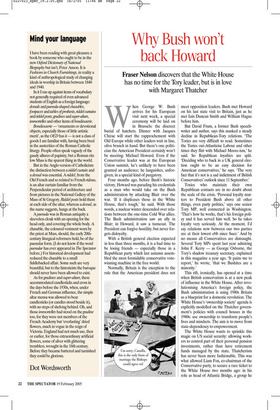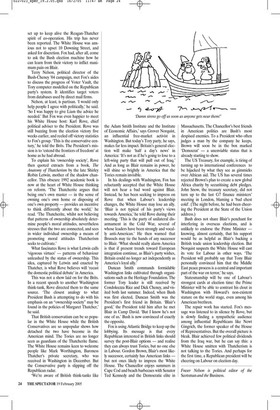Why Bush won’t back Howard
Fraser Nelson discovers that the White House has no time for the Tory leader, but is in love with Margaret Thatcher When George W. Bush arrives for his European visit next week, a special ceremony will be laid on in Brussels: the discreet burial of hatchets. Dinner with Jacques Chirac will start the rapprochement with Old Europe while other leaders wait in line, olive branch in hand. But there’s one politician the American President certainly won’t be meeting: Michael Howard. Even if the Conservative leader was at the European Union summit, he’s unlikely to have been granted an audience; he languishes, unforgiven, in a special kind of purgatory.
Four months ago, before Bush’s historic victory, Howard was parading his credentials as a man who would take on the Bush administration by attacking Blair over the war. ‘If it displeases those in the White House, that’s tough,’ he said. With those words, a nuclear winter descended over relations between the one-time Cold War allies. The Bush administration saw an ally in Blair; in Howard, it saw a turncoat. The President can forgive hostility, but never forgets disloyalty.
With a British general election expected in less than three months, it is a bad time to be losing friends — especially those in a Republican party which last autumn assembled the most formidable conservative votewinning machine in the free world.
Normally, Britain is the exception to the rule that the American president does not meet opposition leaders. Bush met Howard on his last state visit to Britain, just as he met Iain Duncan Smith and William Hague before him.
But David Frum, a former Bush speechwriter and author, says this masked a steady decline in Republican-Tory relations. ‘The Tories are very difficult to read. Sometimes the Tories out-Atlanticise Labour and other times they flirt with Michael Moore-ism,’ he said. So Republican loyalties are split. ‘Deciding who to back in a UK general election ought to be an easy decision for American conservatives,’ he says. ‘The very fact that it’s not is a sad indictment of British Conservatives’ outlook since 11 September.’ Tories who maintain their own Republican contacts are in no doubt about the scale of the crisis. ‘Personal loyalty matters to President Bush above all other things, even party politics,’ says one senior Tory MP, well connected in Washington. ‘That’s how he works, that’s his foreign policy and it has served him well. So he takes loyalty very seriously. At the moment, I’d say relations now between our two parties are at their lowest ebb since Suez.’ And by no means all Conservatives are distraught. Several Tory MPs spent last year admiring John F. Kerry — as George Osborne, the Tory’s shadow treasury secretary, explained in this magazine a year ago. ‘It pains me to report,’ he wrote, ‘that we Bushites are a minority.’ This rift, ironically, has opened at a time when British conservatism is at a new peak of influence in the White House. After revolutionising America’s foreign policy, the Bush administration is using 1980s Britain as a blueprint for a domestic revolution. The White House’s ‘ownership society’ agenda is explicitly modelled on the Thatcher government’s policies with council houses in the 1980s: use ownership to transform people’s lives and mindsets. The aim is to move from state-dependency to empowerment.
The White House wants to sprinkle this magic on US social security: allowing workers to control part of their personal pension investments, rather than have retirement funds managed by the state. Thatcherism has never been more fashionable. This was what allowed Liam Fox, co-chairman of the Conservative party, to secure a rare ticket to the White House two months ago: in his role as head of Atlantic Bridge, a group he set up to keep alive the Reagan-Thatcher spirit of co-operation. His trip has never been reported. The White House was anxious not to upset 10 Downing Street, and asked for discretion. Fox had, after all, come to ask the Bush election machine how he can learn from their victory to inflict maximum pain on Blair.
Terry Nelson, political director of the Bush-Cheney ’04 campaign, met Fox’s aides to discuss the progress of Voter Vault, the Tory computer modelled on the Republican party’s system. It identifies target voters from databases used by direct mail firms.
Nelson, at least, is partisan. ‘I would only help people I agree with politically,’ he said. ‘So I was happy to give Liam the advice he needed.’ But Fox was even happier to meet his White House host: Karl Rove, chief political adviser to the President. Rove was still buzzing from the election victory five weeks earlier, and reeled off victory statistics to Fox’s group. ‘This is the conservative century,’ he told the Brits. The President’s mission is to ‘extend the frontiers of freedom’ at home as he had abroad.
To explain his ‘ownership society’, Rove then quoted extracts from a book, The Anatomy of Thatcherism by the late Shirley Robin Letwin, mother of the shadow chancellor. This obscure 1992 academic book is now at the heart of White House thinking on reform. ‘The Thatcherite argues that being one’s own master — in the sense of owning one’s own home or disposing of one’s own property — provides an incentive to think differently about the world,’ he read. ‘The Thatcherite, whilst not believing that patterns of ownership absolutely determine people’s moral attitudes, nevertheless stresses that the two are connected, and sees in wider individual ownership a means of promoting moral attitudes Thatcherism seeks to cultivate.’ What fascinates Rove is what Letwin calls ‘vigorous virtues’ — patterns of behaviour unleashed by the status of ownership. This idea, captured by Letwin and enacted by Thatcher, is what Rove believes will ‘recast the domestic political debate’ in America.
This was not a show laid on for the Brits. In a recent speech to another Washington think-tank, Rove directed them to the same source. ‘The closest analogy to what President Bush is attempting to do with his emphasis on an “ownership society” may be found in the policies of Margaret Thatcher,’ he said.
That British conservatism can be so popular in the White House while the British Conservatives are so unpopular shows how detached the two have become in the American mind. The Tories are no longer seen as guardians of the Thatcherite flame. The White House remains keen to welcome people like Mark Worthington, Baroness Thatcher’s private secretary, who was received in Washington in December. But the Conservative party is slipping off the Republican radar.
‘We’re aware of British think-tanks like the Adam Smith Institute and the Institute of Economic Affairs,’ says Grover Norquist, an influential free-market activist in Washington. But today’s Tory party, he says, makes far less impact. Britain’s general election will make ‘half a day’s news’ in America: ‘It’s not as if he’s going to lose to a left-wing party that will pull out of Iraq.’ And as long as Blair remains in power, he will shine so brightly in America that the Tories remain invisible.
In his dealings with Washington, Fox has reluctantly accepted that the White House will not hear a bad word against Blair. Instead, he has been seeking to impress on Rove that when Labour’s leadership changes, the White House may lose an ally. ‘Blair is not typical of his party’s views towards America,’ he told Rove during their meeting. ‘This is the party of unilateral disarmament in the Cold War, several of whose leaders have been strongly and vocally anti-American.’ He then warned that Brussels may tie the hands of any successor to Blair. ‘What should really alarm America is that if present trends toward European integration continue, as Blair’s party wishes, Britain could no longer act independently as America’s loyal ally.’ Duncan Smith commands formidable Washington links cultivated through organisations such as the Heritage Foundation. The former Tory leader is still received by Condoleezza Rice and Dick Cheney, and visited both last summer. Indeed, when Bush was first elected, Duncan Smith was the President’s first friend in Britain. ‘Blair’s good,’ the President told him after he met Blair in Camp David. ‘But I know he’s not one of us.’ Bush is now convinced of exactly the opposite.
Fox is using Atlantic Bridge to keep up the lobbying. Its message is that every Republican interested in British links should survey the post-Blair options — and realise they can always trust Tories, but no one else in Labour. Gordon Brown, Blair’s most likely successor, certainly has American links but not ones likely to impress the White House. The Chancellor enjoys summers in Cape Cod and beach barbecues with Senator Ted Kennedy and the Democratic elite in Massachusetts. The Chancellor’s best friends in American politics are Bush’s most despised enemies. To a President who often judges a man by the company he keeps, Brown will soon be in the box marked ‘Democrat’ — a unenviable status that is already starting to show.
The US Treasury, for example, is tiring of turning up to international conferences to be hijacked by what they see as gimmicks over African aid. The US has several times rejected Brown’s plan to create a new global Africa charity by securitising debt pledges. John Snow, the treasury secretary, did not turn up to the last G7 finance ministers’ meeting in London, blaming a ‘bad chest cold’. (The night before, he had been cheering the President at the State of the Union address.) Bush does not share Blair’s penchant for interfering in overseas elections, and is unlikely to endorse the Prime Minister knowing, almost certainly, that his support would be as helpful as Blair’s backing a British trade union leadership election. But Norquist suspects the White House will cast its vote for Labour in other ways. ‘The President will probably say that Tony Blair personally convinced him that the Middle East peace process is a central and important part of the war on terror,’ he says.
Statesmanship will be one of Labour’s strongest cards at election time: the Prime Minister will be able to contrast his clout in Washington with Howard’s non-existent stature on the world stage, even among his American brethren.
The repair work has started. Fox’s message was listened to in silence by Rove, but is slowly finding a sympathetic audience among influential Republicans like Newt Gingrich, the former speaker of the House of Representatives. But the overall picture is bleak. Blair achieved few political dividends from the Iraq war, but he can say this: a White House smitten with Thatcherism is not talking to the Tories. And perhaps for the first time, a Republican president will be cheering on Labour on election day.


















































 Previous page
Previous page